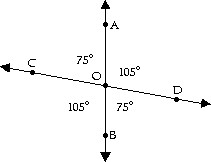Identify the pairs of complementary or supplementary angles, as indicated.Supplementary
A. ?AOD & ?COB; ?AOC & ?DOB
B. ?AOC & ?AOD; ?AOD & ?DOB; ?DOB & ?COB; ?COB & ?AOC
C. ?COB & ?BOD; ?BOD & ?AOD
D. ?AOC & ?AOD; ?AOD & ?DOB
Answer: B
You might also like to view...
Water is draining from a pond. The amount of water, in gallons, remaining in the pond t minutes after draining begins is given by the function 

src="https://sciemce.com/media/3/ppg__cognero__Section_6.3_Estimating_Rates_of_Change__media__25985515-28e8-43d0-b9b5-c8690eccaa24.PNG" style="vertical-align:middle;" /> is -579 when t is 9. Use this information to estimate the amount of water in the pond 16 minutes after draining begins. ? A. 2,309 gallons B. 1,160 gallons C. 4,634 gallons D. None of the above
Evaluate the factorial expression.3!
A. 12 B. 3 C. 2 D. 6
Name the property illustrated by the statement. ? 2 = 1
? 2 = 1
A. identity element for multiplication B. distributive property C. associative property of multiplication D. multiplicative inverse property
Solve the problem.The number of bacteria growing in an incubation culture increases with time according to B = 3200(2)x, where x is time in days. Find the number of bacteria when  and
and 
A. 3200; 25,600 B. 6400; 51,200 C. 3200; 51,200 D. 3200; 12,800